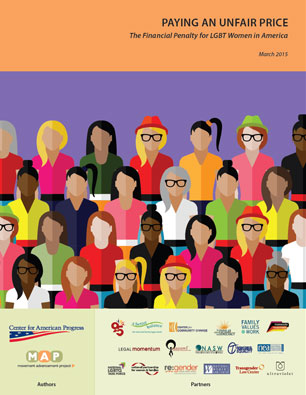The Bottom Line
The economic disparities experienced by LGBT women result from the stigma, discrimination, and the legal disadvantages they experience because they are women and because they are LGBT. Paying an Unfair Price: The Financial Penalty for LGBT Women in America spotlights how LGBT women face unique challenges in three major areas that dramatically increase their economic insecurity and poverty rates:
- JOBS: LGBT women struggle to find and keep good jobs. LGBT women face discrimination when looking for work and while on the job. The result is lower pay and fewer opportunities to advance. Workplaces also may be unwelcoming, hostile, or even physically unsafe. Transgender women face added challenges because they often cannot obtain accurate identity documents necessary for work.
- HEALTH: LGBT women face challenges to good health that impact economic security. Healthcare can be more costly for LGBT women because of discriminatory laws, discrimination by providers, insurance exclusions for transgender people, and inadequate reproductive health coverage. The result: LGBT women are at greater risk for health problems that can affect quality of life and threaten their ability to work, and they often must pay higher costs for healthcare.
- FAMILY RECOGNITION: Lack of support for LGBT women and their families results in higher costs. In many states, LGBT women still are not able to legally marry their partner or establish legal ties to their children. This means LGBT women may not be able to access affordable health insurance, safety net programs meant to keep families out of poverty, and job-protected leave to care for a sick partner. What’s more, like all women in the United States, LGBT women often are forced by law to make difficult and costly choices that can threaten their family’s economic security. The United States, for example, is the only developed country that does not offer paid parental leave.
Paying an Unfair Price: The Financial Penalty for LGBT Women in America offers broad policy recommendations to help address these harmful disparities and improve the lives of LGBT women.
Unfair Price: The Financial Penalty for LGBT Women in AmericaDownload
Recommended citation:


